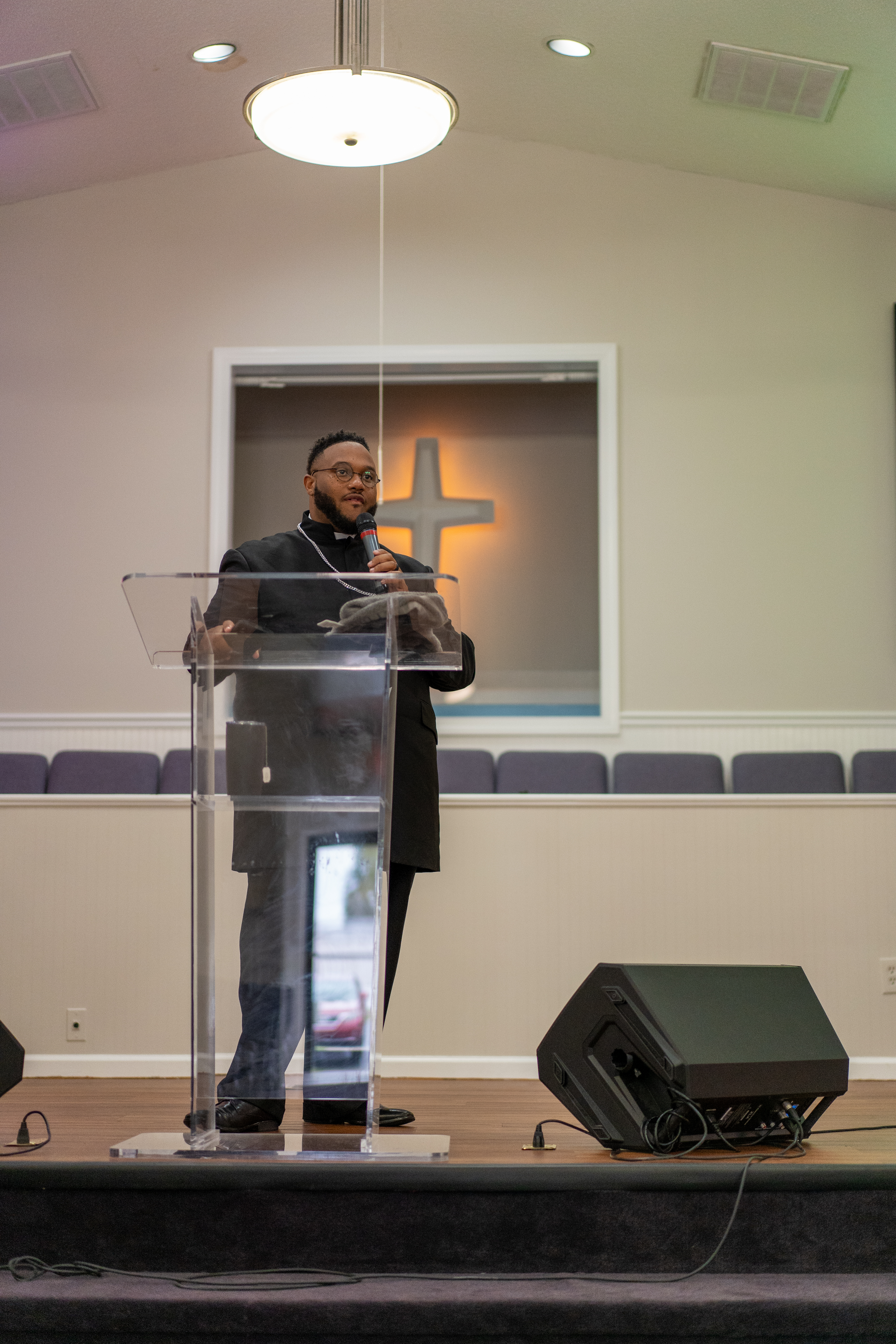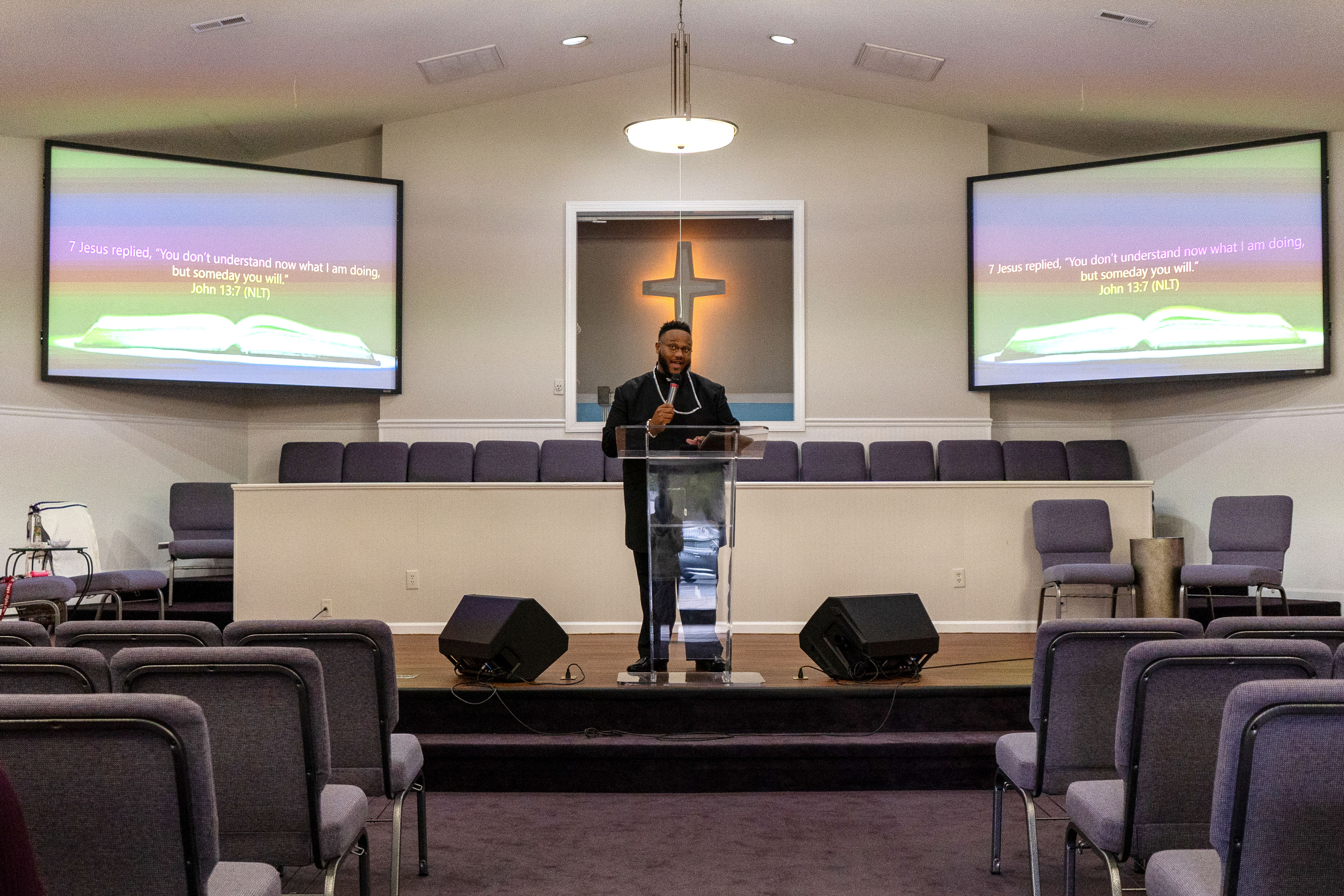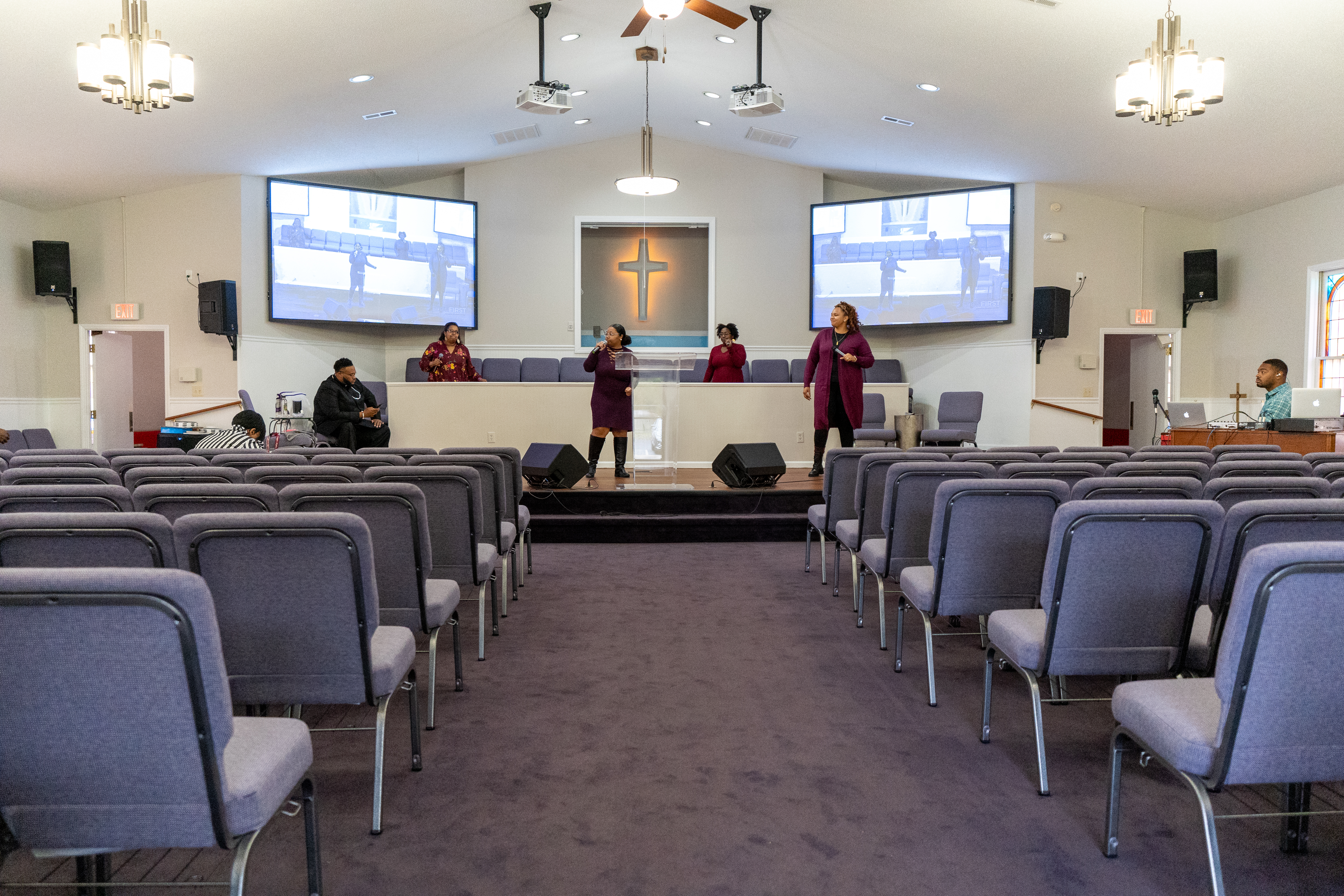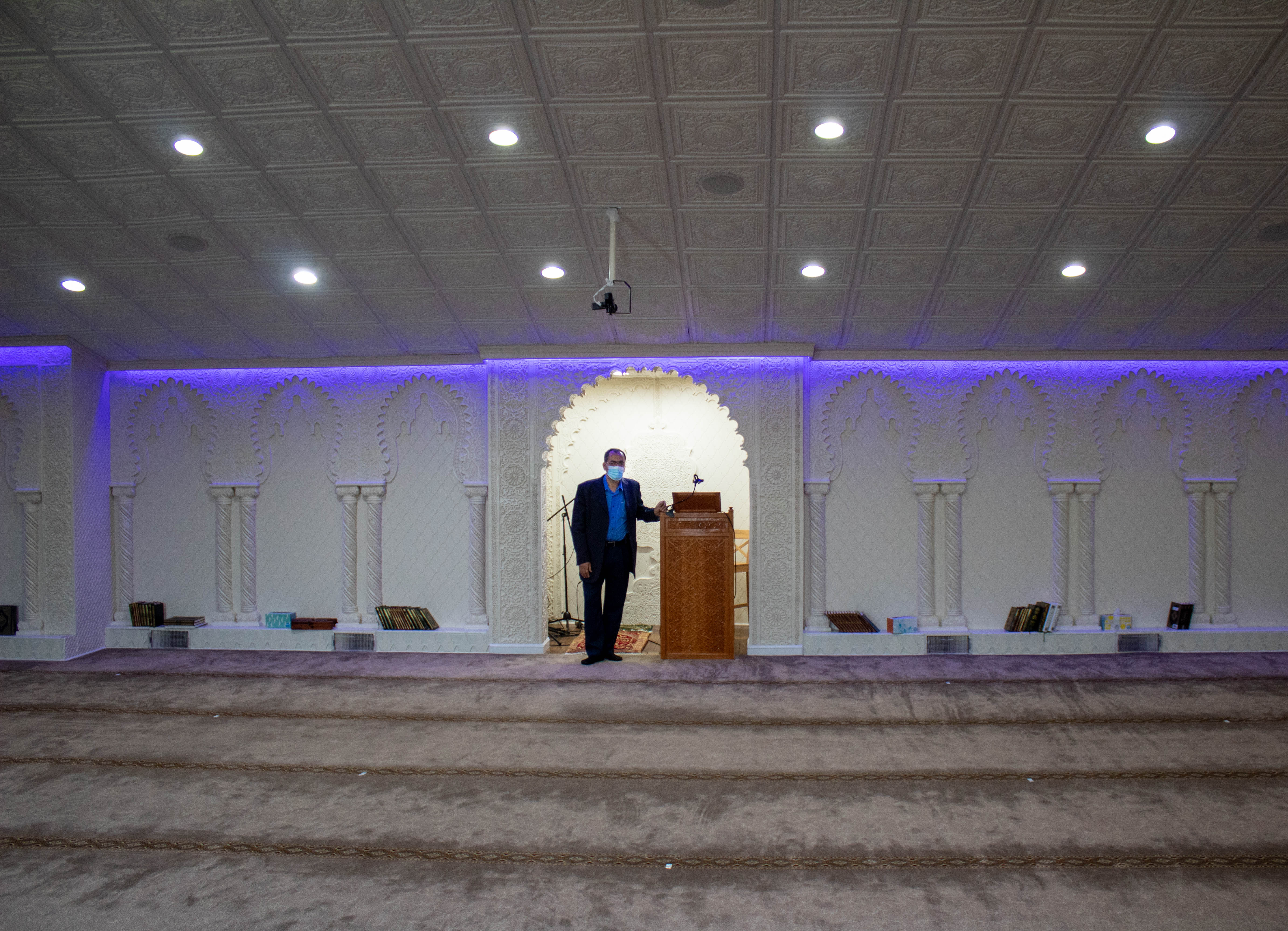The praise team sings, the drummer beats the drum and the Rev. James Wilkes Jr. gives an impassioned sermon each Sunday at Elon First Baptist Church — all to rows of mostly empty pews.
Over 10 months of masks, limited gatherings and physical distancing have affected aspects of everyday life — work, school, social activity and even how people worship during the coronavirus pandemic. As COVID-19 continues to spread, places of worship and people of faith are learning to worship during a pandemic. Thus leaving Wilkes, the senior pastor, to stand at the lectern, with rows of deserted pews, delivering his message to his congregation via Facebook Live, YouTube and by phone.
“I think that we are called to realize the significance of the church now. We understand that while we cannot collectively join together, that we can still collectively join together, virtually,” he said. “And it’s a commitment to continue to worship together whether I’m in New York or I’m in D.C. or I’m in Texas, wherever, because people are traveling now; people are watching us from everywhere.”
Places of worship are not subject to mass gathering limits set by North Carolina, but the state does advise them to limit in-person worship and if possible reduce services inside to 100 people or 30% of the fire capacity. Surges of COVID-19 clusters from religious gatherings peaked in October 2020. Across the state, there have been 148 clusters from religious gatherings which have collectively resulted in 2,098 cases of COVID-19 and 33 deaths as of Jan. 5, 2021, according to the North Carolina Department of Health and Human Services.
BY THE NUMBERS
148 is the number of clusters from religious gatherings in NC.
2,098 is the number of cases as a result of those clusters.
33 are linked to those clusters.
In March, as the pandemic triggered lockdowns across the country — and the world — Elon University Chaplain Jan Fuller had to learn how to be a chaplain over Zoom. She wanted to start a dialogue and encourage people to think about what is going on around the world, so Fuller began to write. Sentences and paragraphs of hopes, fears and day-to-day thoughts are what Fuller writes in her now-weekly chaplain reflections.
“One of the things I’m trying to do a little bit more in my reflection is to be a little more vulnerable than I might otherwise, to invite that for the rest of us, because it’s hard to feel like I’m really getting to know you when we’re both in masks and we’re on screens … it’s not the same,” Fuller said.
These reflections are meant to bring people together for what would be communal activities, now at a time when people are distant. Elon senior Anne-Tillery Melson said maintaining a spiritual community has been an important thing the past few months. Melson is the leader of the senior women’s group of InterVarsity, a Christian ministry at Elon University.
Melson has been a part of InterVarsity since her freshman year, this year she began leading a group of six other women in faith and having this group not just to navigate the pandemic with, but to discuss faith with is an important part of her life.
“Once you feel that peace that comes from being in community and from praying and all the things that come with being a Christian, it’s really hard to imagine what going through the trials of life is like without it,” Melson said.
Building community apart
Melson and her small group meet every Wednesday evening on Zoom to study the Bible and discuss passages. Although three of the group members are her roommates, Bible study is a chance for all of the women to gather together and focus on what they have in common — their faith.
“As far as my house, we pray together, cry together, dance together, all the things but with the other girls ... I see them in person, I check in with them via text, I FaceTime them,” Melson said. “I just always am asking them ‘what can I pray for you about?’ And I think that they feel really, really safe in that.”
Melson said the ability to come together and pray — even through a screen — gives her a moment of peace amid everyday life.
“To feel the Lord’s presence, invite him into that space and then you feel like an immediate sense of peace when that happens,” Melson said. “It kind of focuses everyone because we meet on Wednesday nights, and I think sometimes people … they’ve had a busy day, or they maybe have something going on the next day and their mind is kind of all over the place. And so I find that when we open and close in prayer, it’s really restorative.”
Imam Shaher Sayed of the Burlington Masjid said the mosque had to close for almost three months for the safety of its members. In May, the mosque held a drive-thru iftar — breaking the fast — for Ramadan. Now the masjid has opened back up for a physically distant Friday prayer.
“This masjid can handle almost 200 people and we used to be almost at capacity. Now, with social spacing and distancing … I say to people a maximum [can come to] prayer. Not because not that many people don’t come, but because we don’t want to put anyone at risk, but the community is staying connected,” Sayed said.
From college freshman to church elders, people are seeking a community in spirituality.
Sophomore Miriam Skadron is an engagement intern with Elon Hillel, where she is responsible for integrating freshmen into the Jewish community at Elon. Skadron said that faith and spirituality have been at the forefront of Hillel’s gatherings even when they’re virtual. Although events have been limited at Hillel, some traditions remain the same — Shabbat dinner and high holidays.
“I think it was a really, really great way to bring the community together,” Skadron said. “I think this semester, faith has been especially important because it’s kind of been the cornerstone of the events that Hillel has been doing.”
At Elon First Baptist Church, Wilkes has tasked deacons and ministers with reaching out to the church’s elderly membfers and the rest of the congregation of over 400 people.
“I have called our sick and shut-in, and I’ve called some of our seniors, and I try to do that on a consistent basis. You know, often reach out to people here there,” Wilkes said. “But for the most part, we’ve stayed connected through our leadership of our church.”
The hardships of the pandemic
Leaving over 350,000 dead in the United States and over 1.8 million worldwide, the coronavirus has left its share of devastation and hardships. On top of what the pandemic has brought, the hardships of life go on. Planning sermons and preaching week to week hasn’t been an easy task for Wilkes.
“For me personally, preaching is extremely mentally exhausting now, because I’m preaching alone [to] nobody,” he said. “It’s an empty room, right? So it’s mentally exhausting.”
Even still — despite his exhaustion and own personal hardships — Wilkes continues to preach because it’s something he has been called to do — give hope to others. Wilkes’ father died suddenly in June, unrelated to COVID-19, and he continues to preach every Sunday to help people going through tragedies and hardships like how people helped him.
“Preaching is my passion. Passion is my purpose,” Wilkes said. “It’s being able to get up through everything that I’ve gone through this year, I lost my father and some other things [happened]. Being able to get up and give the same hope somebody gave to me.”

Rev. James Wilkes Jr. of Elon First Baptist Church gives a morning sermon on Sunday, Nov. 15, 2020 to an empty church while recording the service for a virtual audience. [Clare Grant | Elon News Network]
Wilkes said it’s his family and church that’s been able to help him through his loss.
“My church stood with me and around me. My family, my wife, stood around me. And I’m healing. I’m not whole, but I’m healing. And I know that it’s because of the prayers of the people here,” he said.
Tragedies, the stresses of life amid the pandemic have only strengthened Melson’s resolve in her faith. Melson’s faith and small group were there to support her through the death of her grandfather in October, the ongoing pandemic and the stress of classes and the election.
“It really would have been unbearable without knowing that the Lord has a plan that he’s going to provide for me and that I think it’s hard to see sometimes, but I think that we’re not meant to completely understand,” Melson said. “We talked a lot in our small group about how the Lord, how we believe that the Lord is sovereign, and he’s so, he’s so big, and he’s so great that we can’t even really understand that.”
Melson said the support of her faith is what has gotten her through the stresses of life, classes and the pandemic.
“I don’t know how people who don’t have faith in something — anything — but, especially like the relationship that I have with God, like, I don’t know how people are getting through 2020 without it this semester and even just life,” Melson said.
Sayed said keeping people positive — even through hardships — is a theme of the Islamic faith.
“You always have to look up that each hardship would have an end in sight,” he said. “So a lot of reminders of endurance and that the end results is what matters and that this thing has a beginning so it will have an end and all it takes is to do what it takes to survive and it will be over.”
Skadron has been involved with leadership in different Jewsish communities since high school and Hillel was a place hopes that people see the Shabbat and Hillel as a place they can come to for dinner.
“I hope that people see Hillel not as something that they have to do, but something that’s relaxing, something that’s energizing depending on what you’re looking for,” she said. “Something to kind of recalibrate from school and from the stresses of living life during a pandemic.”
Finding hope in religion
For these faith leaders and worship goers, certain passages have given them guidance as the pandemic persists.
While Fuller is a chaplain over all spiritual life at Elon, she is a Christian and the story of the crucifixion is something that she has been returning to over the course of the pandemic. She finds the story important because it shows that God suffered just as humans did.
“I think the story of God’s suffering with human beings … [and] willingly experiencing what it means to live and die as a human being is a powerful resource,” Fuller said. “To me, it’s a powerful story of a God who cares enough to join us in our problems.”
Sayed returns to one of his favorite passages displayed in the lobby of the masjid that reads: "With hardship there is ease, indeed with hardship there is ease." He said that the passage helps him to be “graceful to God, always looking forward.”
“That’s a constant reminder that no matter how hard things get, it will ease at the end of it,” Sayed said.
At one point this year, the demands of life and church had left Wilkes stressed to the point of tears while he was preaching. He said in that moment, a piece of scripture that came to mind read: “Let us not grow weary in well doing, for in due season we shall reap if we do not fret.”
Wilkes said this passage is something he lives by, not just during the pandemic.
“I am believing if we keep holding on — if all of us just keep holding on to God — that we will get to reap a major harvest if we don’t quit,” Wilkes said.



